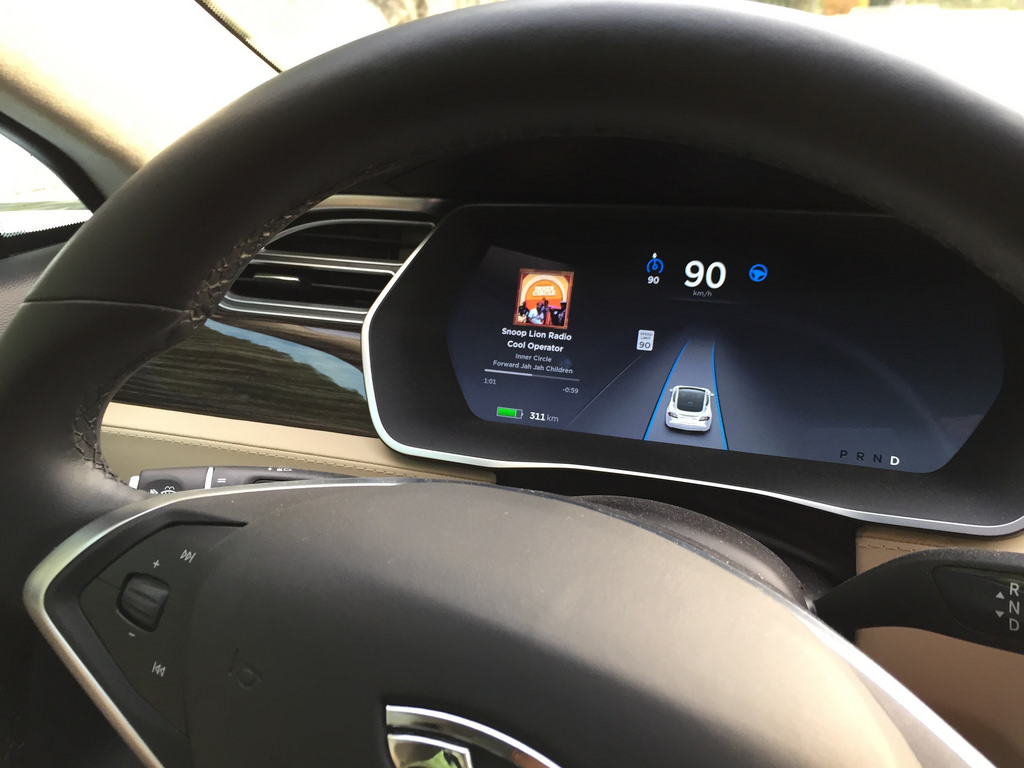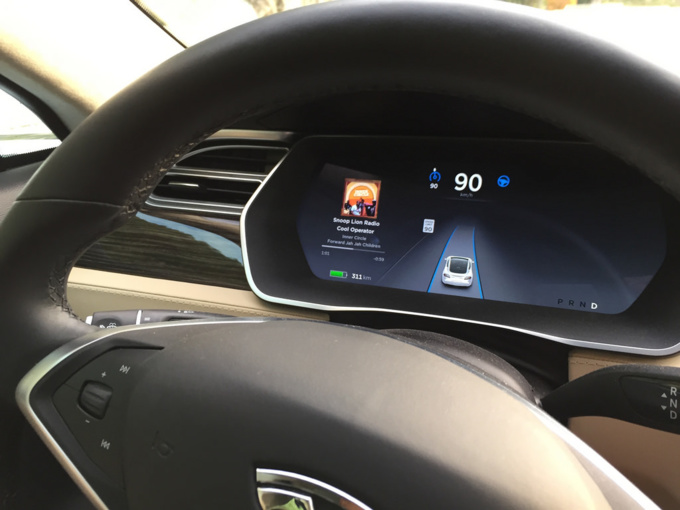American authorities have launched an investigation in connection with an accident with an auto piloted Tesla S. The crash killed the Tesla’s driver occurred on May 7 in the state of Florida. The car on the autopilot mode crashed into a truck that was turning at an intersection. According to Tesla, neither the autopilot nor the driver noticed the wagon’s white part on the background of the bright sky and, therefore, had no time to slow down.
Tesla said on Thursday that National Highway Traffic Safety Administration (NHTSA) is starting investigating the incident. Tesla itself says it is the first fatal incident occurred in 130 million miles (209 million km) of autopilot travelling. Normally, convenient driving in the US gets a fatal accident averagely every 94 million miles of track (151 million km). In the world as a whole, the number amounts to 60 per million miles (97 million km). NHTSA is going to check 25 thousand Tesla S vehicles equipped with the autopilot. If they are found to have problems, they will be withdrawn immediately. Once the accident got into public access, Tesla’s shares fell 2.7%.
The incident involving a car on autopilot renewed debate about safety of unmanned vehicles. Head of the Center for Auto Safety Clarence Ditlow said that if the investigation proves the autopilot’s fault, Tesla will have to withdraw the other cars and fix them. According to him, the autopilot should be able to recognize any situation on the road. "This is an obvious defect, and it should lead to revocation. If you have embedded an autopilot in the vehicle, it means people can trust it", - he added.
In February this year, a car with the autonomous control system developed by Google got in a small accident. Lexus RX450h, going round an obstacle on the road, brushed against a bus moving next to it. The robot incorrectly calculated the bus driver’s possible actions, having decided the bus would give way. Then Google admitted its partial blame for the incident, and reported changes in the vehicles’ software in connection with the accident. In general, experts believe that spread of unmanned vehicles would greatly reduce number of road crashes since they mostly caused by the human factor. According to Ptolemus consulting company, total number of accidents could be reduced by 30% thanks to unmanned vehicles.
One of the most difficult ethical issues for producers of unmanned vehicles is to choose what is more important: safety of the passenger or the pedestrian, says a scientist at the Massachusetts Institute of Technology.
From June to November 2015, an international team of researchers led by Joshua Green held six online tests among US residents. The researchers have found that most people believe that total number of deaths in accidents involving unmanned cars should be minimized, even at the cost of passengers’ lives. Then, however, the respondents were asked to imagine themselves on the place of the car's passengers. Answering to this, they said that the car has to protect its passengers at any cost. Only a third of respondents agreed to buy a car without a self-defense function.
Every year, traffic accidents kill more than 1.2 million people. Other 20-50 million get injured, follows from the World Health Organization’s data. The human factor, such as drunk driving without a fastened seat belt and cyclists without helmets, is the cause for most of the accidents.
source: bloomberg.com
Tesla said on Thursday that National Highway Traffic Safety Administration (NHTSA) is starting investigating the incident. Tesla itself says it is the first fatal incident occurred in 130 million miles (209 million km) of autopilot travelling. Normally, convenient driving in the US gets a fatal accident averagely every 94 million miles of track (151 million km). In the world as a whole, the number amounts to 60 per million miles (97 million km). NHTSA is going to check 25 thousand Tesla S vehicles equipped with the autopilot. If they are found to have problems, they will be withdrawn immediately. Once the accident got into public access, Tesla’s shares fell 2.7%.
The incident involving a car on autopilot renewed debate about safety of unmanned vehicles. Head of the Center for Auto Safety Clarence Ditlow said that if the investigation proves the autopilot’s fault, Tesla will have to withdraw the other cars and fix them. According to him, the autopilot should be able to recognize any situation on the road. "This is an obvious defect, and it should lead to revocation. If you have embedded an autopilot in the vehicle, it means people can trust it", - he added.
In February this year, a car with the autonomous control system developed by Google got in a small accident. Lexus RX450h, going round an obstacle on the road, brushed against a bus moving next to it. The robot incorrectly calculated the bus driver’s possible actions, having decided the bus would give way. Then Google admitted its partial blame for the incident, and reported changes in the vehicles’ software in connection with the accident. In general, experts believe that spread of unmanned vehicles would greatly reduce number of road crashes since they mostly caused by the human factor. According to Ptolemus consulting company, total number of accidents could be reduced by 30% thanks to unmanned vehicles.
One of the most difficult ethical issues for producers of unmanned vehicles is to choose what is more important: safety of the passenger or the pedestrian, says a scientist at the Massachusetts Institute of Technology.
From June to November 2015, an international team of researchers led by Joshua Green held six online tests among US residents. The researchers have found that most people believe that total number of deaths in accidents involving unmanned cars should be minimized, even at the cost of passengers’ lives. Then, however, the respondents were asked to imagine themselves on the place of the car's passengers. Answering to this, they said that the car has to protect its passengers at any cost. Only a third of respondents agreed to buy a car without a self-defense function.
Every year, traffic accidents kill more than 1.2 million people. Other 20-50 million get injured, follows from the World Health Organization’s data. The human factor, such as drunk driving without a fastened seat belt and cyclists without helmets, is the cause for most of the accidents.
source: bloomberg.com



















